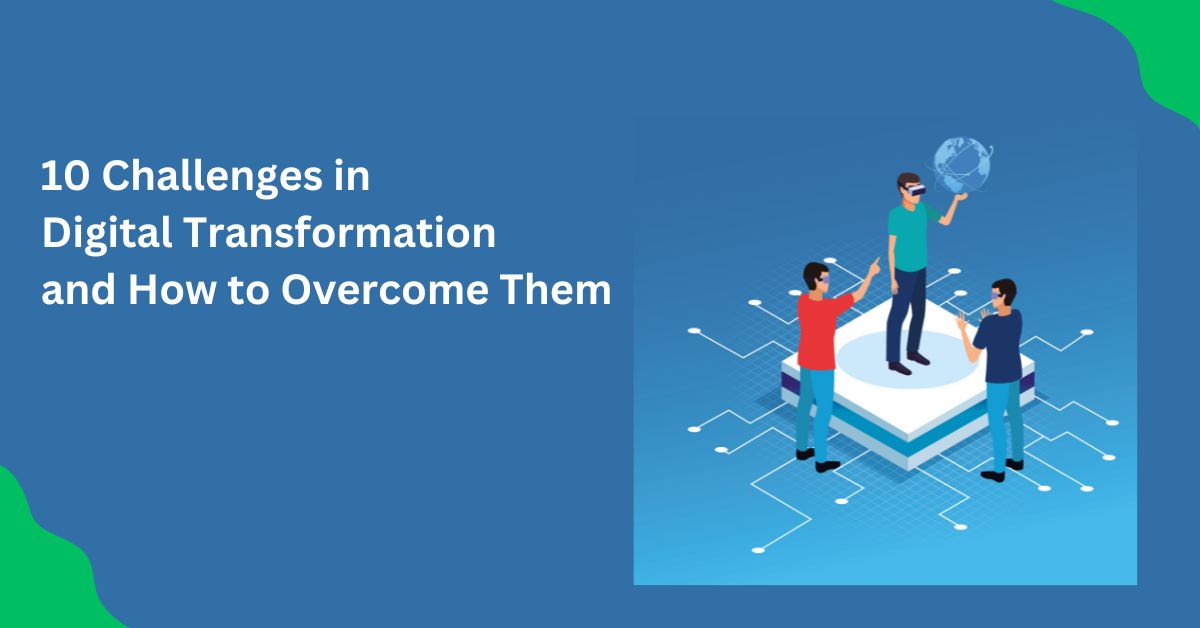Digital transformation has become imperative for businesses to stay competitive and relevant in today's fast-paced market. However, embarking on this journey is not without its challenges. From technological hurdles to cultural resistance, organizations often encounter various obstacles along the way. In this article, we'll explore 10 common challenges in digital transformation and provide actionable strategies to overcome them.
-
Lack of Clear Strategy
Challenge: Many organizations dive into digital transformation without a clear strategy in place. This can lead to confusion, wasted resources, and ineffective implementation.
Solution: Before embarking on any digital transformation initiative, it's crucial to develop a comprehensive strategy that aligns with your business goals. Define clear objectives, identify key stakeholders, and create a roadmap outlining the steps needed to achieve success. Regularly review and adapt your strategy as needed to stay agile in a rapidly evolving landscape.
-
Resistance to Change
Challenge: Change can be met with resistance, particularly from employees who are comfortable with existing processes and systems.
Solution: To overcome resistance to change, foster a culture of innovation and continuous learning within your organization. Provide training and support to help employees adapt to new technologies and workflows. Communicate the benefits of digital transformation clearly and involve employees in the process to gain their buy-in and commitment.
-
Legacy Systems and Infrastructure
Challenge: Outdated legacy systems and infrastructure can pose significant barriers to digital transformation efforts, hindering agility and scalability.
Solution: Gradually modernize your IT infrastructure by leveraging cloud-based solutions, APIs, and modular architectures. Prioritize integration and interoperability to ensure seamless communication between new and existing systems. Invest in robust cybersecurity measures to protect sensitive data during the transition.
-
Data Privacy and Security Concerns
Challenge: With the increasing volume of data being generated and processed, ensuring data privacy and security is a major challenge for organizations undergoing digital transformation.
Solution: Implement robust data governance policies and compliance frameworks to safeguard sensitive information. Encrypt data in transit and at rest, and regularly conduct security audits to identify and address vulnerabilities. Educate employees about best practices for data handling and privacy to mitigate the risk of breaches.
-
Scalability Issues
Challenge: As businesses grow and evolve, scalability becomes a pressing concern, particularly for digital solutions that need to accommodate increasing demand.
Solution: Design your digital infrastructure with scalability in mind from the outset. Embrace modular and flexible architectures that can easily scale up or down based on demand. Leverage automation and orchestration tools to streamline processes and optimize resource utilization. Regularly monitor performance metrics and adjust capacity as needed to ensure smooth operations.
-
Talent Shortage
Challenge: Finding and retaining skilled talent with expertise in digital technologies such as AI, data analytics, and cybersecurity can be challenging in today's competitive job market.
Solution: Invest in talent development initiatives, including training programs, certifications, and partnerships with educational institutions. Offer competitive salaries and benefits to attract top talent and create a supportive work environment that fosters creativity and innovation. Consider outsourcing certain tasks to external specialists or collaborating with technology partners to fill skill gaps.
-
Siloed Organizational Structure
Challenge: Siloed organizational structures and departmental silos can hinder collaboration and communication, impeding the success of digital transformation initiatives.
Solution: Break down silos by promoting cross-functional collaboration and communication across departments. Foster a culture of transparency and knowledge sharing, encouraging teams to work together towards common goals. Implement tools and technologies that facilitate collaboration, such as project management software, collaborative workspaces, and communication platforms.
-
Budget Constraints
Challenge: Limited budget and resources can pose significant challenges for organizations looking to undertake large-scale digital transformation projects.
Solution: Prioritize initiatives based on their potential impact and return on investment (ROI). Break down projects into smaller, more manageable phases to spread costs and minimize risk. Explore alternative funding options such as grants, partnerships, or venture capital investment. Focus on cost-saving measures such as cloud computing, open-source software, and lean methodologies to maximize efficiency.
-
Customer Resistance
Challenge: Customers may be resistant to changes in products or services resulting from digital transformation, particularly if they disrupt familiar workflows or user experiences.
Solution: Engage with customers early and often throughout the digital transformation process to gather feedback and address concerns. Communicate the value proposition of new offerings and emphasize how they will benefit customers. Provide training and support to help customers navigate changes and ensure a smooth transition. Monitor customer sentiment and iterate based on feedback to continuously improve the user experience.
-
Lack of Executive Support
Challenge: Without strong leadership and executive support, digital transformation initiatives may struggle to gain traction and secure the necessary resources.
Solution: Secure buy-in from senior leadership by demonstrating the strategic importance of digital transformation for long-term growth and competitiveness. Clearly articulate the vision, objectives, and expected outcomes of the initiative, and align them with the organization's overall goals and priorities. Engage executives as champions and advocates for change, empowering them to remove obstacles and drive alignment across the organization.
In conclusion, digital transformation presents numerous challenges for organizations, ranging from technical complexities to cultural barriers. However, with careful planning, strategic execution, and a commitment to continuous improvement, these challenges can be overcome. By addressing the root causes of resistance, embracing innovation, and fostering collaboration, businesses can unlock the full potential of digital transformation services and position themselves for success in the digital age.


No comments yet